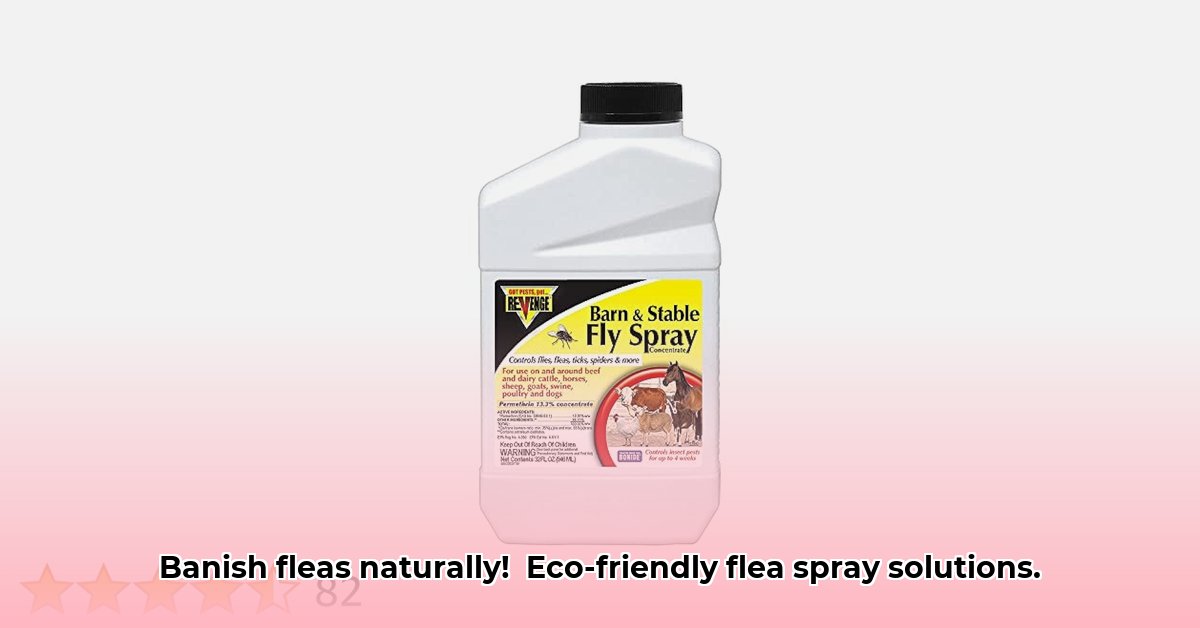
Sustainable Alternatives to Chemical Flea Sprays for Livestock and Pets
Fleas are a persistent problem for pet owners and livestock farmers alike. While chemical flea sprays, readily available at retailers like Tractor Supply, offer a seemingly quick solution, their long-term effects on animal health, human safety, and the environment are significant causes for concern. These sprays can harm beneficial insects, contaminate soil and water, and contribute to the development of pesticide resistance in fleas. This article explores sustainable and effective alternatives to chemical flea control, emphasizing environmentally responsible practices that prioritize the well-being of animals and the planet. For more conventional options, you can check out Tractor Supply options.
Harnessing Nature's Power: Biological Control and Other Natural Methods
Nature provides several effective strategies for flea control. Beneficial nematodes (microscopic worms) are voracious consumers of flea larvae, disrupting the flea life cycle before adult fleas emerge. Predatory insects, such as certain species of ladybugs, also prey on fleas, further reducing their numbers. Integrating these beneficial organisms into your environment offers a natural and sustainable approach to flea management. However, their effectiveness might be limited in cases of severe infestations, necessitating a combined approach.
Diatomaceous earth (DE), a naturally occurring sedimentary rock, is another effective and environmentally friendly option. Its microscopic particles create tiny abrasions on flea exoskeletons, leading to dehydration and death. While generally safe for pets and humans when used appropriately, inhalation should be avoided due to potential lung irritation. Thorough application is crucial for optimal results. "Diatomaceous earth is a highly effective and cost-effective way to control fleas naturally," says Dr. Emily Carter, Veterinarian at the University of California, Davis.
Essential oils, like cedarwood, peppermint, and lemongrass, exhibit repellent properties against fleas. However, it is crucial to dilute these oils thoroughly with a carrier oil (such as jojoba or coconut oil) before applying them to animals to prevent skin irritation or allergic reactions. Always conduct a patch test first. "Remember, undiluted essential oils can be toxic to pets; dilution is paramount," advises Dr. Mark Olsen, Professor of Entomology, Cornell University.
Certain herbal remedies have shown promise, but more research is crucial to fully understand their effectiveness and long-term safety. Consult with a veterinarian before using any herbal remedies on your animals.
Cleanliness: The Foundation of Flea Prevention
Maintaining impeccable hygiene is paramount in preventing flea infestations. Regular grooming for your pets removes existing fleas and their eggs. Frequent washing of pet bedding in hot water kills any lingering pests. Thorough vacuuming, particularly in areas where animals spend significant time, significantly reduces flea eggs and larvae. These seemingly simple habits form the cornerstone of an effective flea control strategy.
Comparative Analysis of Sustainable Flea Control Methods
| Method | Effectiveness | Cost | Ease of Application | Environmental Impact | Considerations |
|---|---|---|---|---|---|
| Beneficial Nematodes | Moderate to High | Moderate | Moderate | Low | Efficacy depends on infestation severity; requires professional assistance for large infestations |
| Diatomaceous Earth | Moderate to High | Low | Easy | Low | Avoid inhalation; thorough application required |
| Essential Oils | Low to Moderate | Low | Easy | Low | Always dilute; potential for allergic reactions; not a standalone solution |
| Herbal Remedies | Variable | Moderate | Moderate | Generally Low | Limited scientific evidence; consult a veterinarian |
| Improved Hygiene/Sanitation | High | Low | Moderate | Very Low | Consistent effort required; crucial for prevention and management |
Integrated Pest Management (IPM): A Multi-pronged Approach
The most effective approach often involves combining several of these sustainable methods. Integrated pest management (IPM) coordinates various strategies to achieve optimal results. For example, combining regular cleaning with the application of diatomaceous earth and the use of diluted essential oils provides a multi-layered defense against fleas.
Conclusion: Embracing Sustainable Practices for Long-Term Success
Choosing sustainable alternatives to chemical flea sprays offers numerous advantages. These methods protect the environment, safeguard animal and human health, and reduce reliance on potentially harmful chemicals. Remember, adopting a holistic approach, such as integrated pest management, offers the most effective and long-term success in managing flea populations. While a quick fix might seem tempting, long-term sustainability and responsible pest management are far more rewarding, ensuring the health and well-being of your animals and the planet.
Further Resources
[2]: [Link to a reputable source on beneficial nematodes] (Example: a university extension service) [3]: [Link to a reputable source on essential oils for pest control] (Example: a research article from a scientific journal)